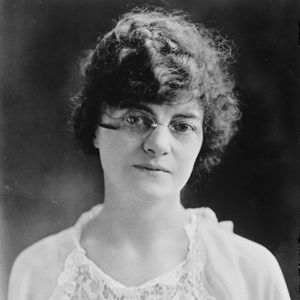calsfoundation@cals.org
Bertha Hale King (1878–?)
aka: Bertha Hale White
Bertha Hale King was a socialist activist in the first part of the twentieth century. Although born in Illinois, she received most of her early education in Arkansas before leaving the state to serve as a high-ranking official in the national Socialist Party.
Bertha Hale was born in Nashville, Illinois, in 1878. Her father was a farmer, but little else is known about her parents. She attended primary school in Golden City, Missouri, just over the state line from Illinois. The family then moved to Arkansas. Following graduation from high school in Fort Smith (Sebastian County), she attended Buckner College, a small Baptist school just a few miles north of Huntington (Sebastian County). In preparation for a teaching career, she took correspondence courses from the University of Chicago. She taught for a while and also worked as a writer and for a newspaper.
Shortly after the turn of the century, she married William Brown, and they lived in Huntington while she worked with Dan Hogan in the Arkansas Socialist Party headquarters. After that apprenticeship, she moved to Chicago, Illinois, where she joined the national office in 1913. From 1919 to 1924, she served as assistant national secretary and office manager at the party’s Chicago headquarters. She and Brown divorced, and she married Dan White of Boston, Massachusetts, in 1919 or 1920.
In 1924, Bertha White was named the party’s national executive secretary. In that role, she served as the editor, managing editor, and business manager of the organization’s newspaper, The Socialist World. In 1922, she ran as the Socialist Party candidate for Illinois superintendent of public instruction, finishing third and garnering 2.23 percent of the vote. She authored the article “Jesse Molle and the Socialist Party,” published in the New York Call in July 1921. Among her other responsibilities, she headed efforts to secure amnesty for those in jail due to their opposition to World War I, action made illegal by the Sedition Act. Although she and Socialist Party leader Eugene Debs frequently clashed, each blaming the other for the party’s decline, Debs was lavish in his praise of her efforts related to the amnesty campaign. Her work in that effort came to fruition on December 19, 1921, when, after serving as director of the amnesty campaign, White presented a petition to President Warren G. Harding that had been signed by 30,000 citizens of Terre Haute, Indiana, the birthplace of Eugene Debs. The petition called for the release of Debs as a Christmas present to the country. On December 23, Harding announced a grant of amnesty to Debs and more than twenty other political protestors.
After over a decade of service to the socialist cause, White resigned as national executive secretary in the fall of 1925 upon the direction of her physician, who ordered rest and a milder climate.
She and Dan White divorced, and she married lecturer and writer Judson King in 1926, taking his name to become Bertha Hale King. Around this time, she seems to have left behind both her socialist ideals and her allies and associates from the cause.
Judson King, who was serving as director of the Washington-based National Popular Government League, died in 1958, and Bertha King donated his papers to the Library of Congress the following year. After that, she faded from public view, and the date of her death and the location of her burial are unrecorded.
For additional information:
Pierce, Michael. “Great Women All, Serving a Glorious Cause: Freda Hogan Ameringer’s Reminiscences of Socialism in Arkansas.” Arkansas Historical Quarterly 69 (Winter 2010): 293–324.
The Socialist World, October 1925. Online at https://www.marxists.org/history//usa/pubs/socialist-world/v06n08-aug-1925-Soc-World.pdf (accessed November 23, 2020).
William H. Pruden III
Ravenscroft School
 Early Twentieth Century, 1901 through 1940
Early Twentieth Century, 1901 through 1940 Mass Media
Mass Media Politics and Government
Politics and Government Women
Women Bertha Hale King
Bertha Hale King 




Comments
No comments on this entry yet.